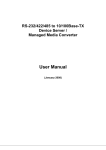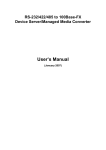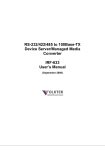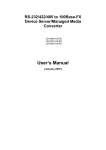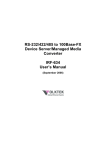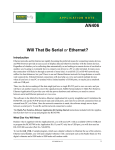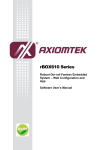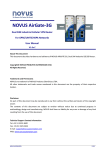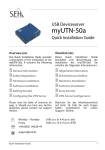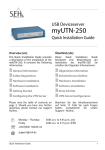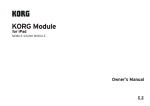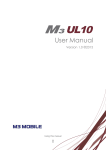Download User`s Manual
Transcript
RS-232/422/485 to 10/100Base-TX Device Server/Managed Media Converter User’s Manual (January 2007) RS-232/422/485 TO 100BASE-TX DEVICE SERVER COPYRIGHT All rights reserved. No part of this publication may be reproduced, stored in a retrieval system, or transmitted in any form or by any means, whether electronic, mechanical, photo copying, recording or otherwise, without the prior written permission of the publisher. FCC WARNING This equipment has been tested and found to comply with the limits for a class A device, pursuant to part 15 of FCC rules. These limits are designed to provide reasonable protection against harmful interference in a commercial installation. This equipment generates, uses and can radiate radio frequency energy and, if not installed and used in accordance with the instructions, may cause harmful interference to radio communication. Operation of this equipment in a residential area is likely to cause harmful interference, in which case, the user will be required to correct the interference at the user’s own expense. CE This is a Class A product. In a domestic environment, this product may cause radio interference in which case the user may be required to take adequate measures. Take special note to read and understand all the content in the warning boxes: Warning i RS-232/422/485 TO 100BASE-TX DEVICE SERVER TABLE OF CONTENTS 1 ABOUT THIS GUIDE.........................................................................1 1.1 1.2 1.3 1.4 1.5 1.6 2 Welcome ............................................................................................................1 Purpose .............................................................................................................1 Terms/Usage .....................................................................................................1 Features.............................................................................................................1 Specifications ...................................................................................................2 Package Contents.............................................................................................3 HARDWARE DESCRIPTION ............................................................4 2.1 2.2 3 Product Overview .............................................................................................4 Product Illustrations.........................................................................................4 INSTALLATION.................................................................................5 3.1 3.2 3.3 3.4 3.5 3.6 Location.............................................................................................................5 Wall Mount Installation.....................................................................................5 Din Rail Mount Installation...............................................................................5 Powering On Unit..............................................................................................6 DB9 Male Connector Pin Assignments...........................................................7 Serial Connection .............................................................................................7 4 LED INDICATORS ............................................................................8 5 USER INTERFACE STARTUP..........................................................9 5.1 5.2 5.3 6 Console Port Access ........................................................................................9 Telnet Access..................................................................................................11 Web Access.....................................................................................................12 CONFIGURATION MANAGEMENT ................................................13 6.1 Menu-driven User Interface............................................................................13 6.1.1 6.1.2 6.1.3 6.1.4 6.1.5 6.1.6 6.1.7 6.1.8 6.2 6.3 System Information Menu...............................................................................................13 DHCP Configuration Menu..............................................................................................14 Operation Mode Menu .....................................................................................................15 RS-232/422/485 UART Menu ...........................................................................................20 Connection Status ...........................................................................................................20 TFTP Firmware Upgrade .................................................................................................21 SNMP Configuration........................................................................................................21 System Restart Menu ......................................................................................................23 Command Line Interface ................................................................................24 Web Graphic User Interface...........................................................................25 6.3.1 6.3.2 System Information .........................................................................................................25 Master Information ..........................................................................................................25 ii RS-232/422/485 TO 100BASE-TX DEVICE SERVER 6.3.3 6.3.4 6.3.5 6.3.6 6.3.7 6.3.8 6.3.9 RS-232/422/485 Transfer Mode Configuration ..............................................................26 Serial Connect Status......................................................................................................30 User Configuration ..........................................................................................................31 Firmware Download.........................................................................................................31 SNMP Community Configuration ...................................................................................32 IP Trap...............................................................................................................................32 System Restart.................................................................................................................33 iii RS-232/422/485 TO 100BASE-TX DEVICE SERVER 1 About This Guide 1.1 Welcome Thank you for selecting the RS-232/422/485 to 10/100Base-TX Device Server / Managed Media Converter. This unit is designed to provide an RS-232/422/485 connection over twisted-pair cable where the connected devices have RS-232/422/485 interfaces. Enabling serial devices such as CNCs and PLCs to instantly connect to an existing Ethernet/ Fast Ethernet network, the Serial-to-Ethernet Device Server / Managed Media Converter represents a robust solution for devices controllers for MIS personnel. This product can either be used as Device Server or Managed Media Converter. 1.2 Purpose This guide discusses how to install and configure your RS-232/422/485 to 10/100BaseTX Device Server/ Managed Media Converter. 1.3 Terms/Usage In this guide, the term “Device Server / Managed Media Converter” or “Device Server” (first letter upper case) refers to your RS-232/422/485 to 10/100Base-TX Device Server / Managed Media Converter, and “device server / managed media converter” (first letter lower case) refers to other device servers / managed media converter. 1.4 • • • • • • • • • • • • Features Device Server & Managed Media Converter Mode option Complies with EIA/TIA and IEEE standards Supports 4 wires full duplex asynchronous serial data transmission (RS-422/485) Supports 2 wires half-duplex asynchronous serial data transmission (RS-485) Supports serial port asynchronous data rates up to 115.2 Kbps Extended distances up to 1.2 km (24 AWG) using RS-422/485 Auto-detecting 10/100 Mbps Ethernet interface Terminator feature improves signal quality and distance LEDs for ‘at-a-glance’ device status Wall mount or Din-Rail mountable installation Power range 9~32V DC FCC Class A & CE approved 1 RS-232/422/485 TO 100BASE-TX DEVICE SERVER 1.5 Specifications Standards: IEEE 802.3 (10BASE-T Ethernet); IEEE 802.3u (100BASE-TX/ Fast 232/422/485; EIA/TIA-5744 Ethernet); EIA/TIA RS- Ports: 1x UTP 100/120ohm; RJ-45 type 1x 9-pin serial connector; D-sub, Male Max. Distance: UTP: 100 meters (Cat 3/4/5.) Serial: 15 meters (RS-232) 1,200 meters (RS-422, RS-485) Data Rates: UTP: 10 or 100 Mbps Serial: 115.2 kbps (asynchronous) Signals: RS-232: TxD, RxD, CTS, RTS, DTR, DSR, RI, DCD, GND RS422: TxD+/-, RxD+/-, GND RS-485: Data+, Data-, GND Configuration: Bits Per Second: 38400 Parity: None Data bits: 8 Stop bits: 1 Flow Control: None (The console connection is only available once the DIP switch 1 is ON) Switches: DIP 1: Enables / disables console / data communication mode DIP 2: Enables / disables RS-232 DIP 3: Enables / disables RS- 422/485 (4-wire) DIP 4: Enables / disables RS-485 (2-wire) DIP 5: N/A DIP 6: N/A DIP 7: Enables / disables termination (TMR) Power: External power adapter; 9~32V DC @800mA Frequency: 47Hz to 63Hz Environment: Temperature: Operating: 0°C to 50°C Relative Humidity: 10% to 80%, non-condensing Storage: -20°C to 80°C Relative Humidity: 5% to 90%, non-condensing Emissions: FCC Part 15 of Class A & CE approved Dimensions: 109.2 x 90 x 30mm (L x W x H) Weight: 280 grams 2 RS-232/422/485 TO 100BASE-TX DEVICE SERVER 1.6 Package Contents The package should include the following: • • • • • • • • One Device Server / Managed Media Converter One power adapter (please check connector type and input power specification) Four self-adhesive pads DIN Rail Kit Screws for wall-mount installation Quick Installation Guide User’s Manual CD Software CD 3 RS-232/422/485 TO 100BASE-TX DEVICE SERVER 2 Hardware Description 2.1 Product Overview The Device Server / Managed Media Converter features complete Ethernet and TCP/IP network support that allows devices in industry with RS-232/422/485 connectors such as milling machines, measurement instruments, and robots to connect to LAN based automation. Other devices typically found on campus networks such as card readers, code readers, lab equipment, medical equipment, and other similar serial devices can now instantly migrate to a TCP/IP network. Additionally, by deploying the device server mode, enable users to monitor and manage up to 256 serial devices from single PC with the help of Serial IP Redirector software for Device Server mode. 2.2 Product Illustrations Front Panel RJ-45 RS-232/422/485, DB9 Male LEDs Rear Panel DIP Switches Power LED 4 Power Connector RS-232/422/485 TO 100BASE-TX DEVICE SERVER 3 Installation To install your Device Server / Managed Media converter, please see the following procedures: • Location • Din Rail Mounting • Desktop Installation • Powering On Unit • Connecting Copper Cables • DB9 Male Connector Pin Assignment • Serial Connection • Ethernet Connection 3.1 Location The location selected for installing the Device Server / Managed Media Converter may greatly affect its performance. When selecting a site, we recommend considering the following rules: 1. 2. 3. 4. 3.2 Install the Device Server / Managed Media Converter in a fairly cool and dry place. See Technical Specifications for the acceptable temperature and humidity operating ranges. Install the Device Server / Managed Media Converter in a location free from strong electromagnetic field generators (such as motors), vibration, dust, and direct exposure to sunlight. Leave at least 5cm of space at the front and rear of the unit for ventilation. Affix the provided rubber pads to the bottom of the Device Server / Managed Media Converter for grip, and to protect the case from scratching. Wall Mount Installation Device Server can also be installed by wall mounting. The backside casing provides space for two screws each side. Identify the exact location at wall by placing the Device Server / Managed Media Converter and marking the screw positions. Use the screw (include in the package) and snug them well to fix the Device Server / Managed Media Converter. 3.3 Din Rail Mount Installation The aluminum DIN Rail attachment plate should already be affixed to the back panel of the Device Server / Managed Media Converter. If you need to attach the DIN Rail plate, assure that the stiff metal spring is situated towards the top. Attaching the Device Server / Managed Media Converter to the DIN rail is easy, just align, and attach the top rail, then press down and snap forward the Device Server / Managed Media Converter to snap in the bottom rail, as shown in the figures below. 5 RS-232/422/485 TO 100BASE-TX DEVICE SERVER Use following steps set up the Device Server / Managed Media Converter: • • • The surface must support at least 500 gm for the Device Server / Managed Media Converter. The power outlet should be within 1.82 meters (6 feet) of the Device Server / Managed Media Converter. Visually inspect the power adapter and make sure that it is properly connected. Make sure that there is proper heat dissipation from and adequate ventilation around the Device Server / Managed Media Converter. Do not place heavy objects on the product. Warning Please exercise caution when using power tools. Also, install this unit away from damp or wet locations, or in close proximity to very hot surfaces. These types of environments can have a detrimental effect on the unit and cables. 3.4 Powering On Unit The Device Server / Managed Media Converter uses external power supply 9~32V DC @ 0.8A 50~60 Hz. 1. 2. 3. Insert the power cable plug directly into the receptacle located at the back of the device. Plug the power adapter into an available socket. Check the rear-panel LEDs as the device is powered on to verify that the Power LED is lit. If not, check that the power cable is correctly and securely plugged in. NOTE: The RJ-45 port accepts both ‘straight-through’ and ‘cross-over’ Ethernet cables without the need to re-configure the port. 6 RS-232/422/485 TO 100BASE-TX DEVICE SERVER 3.5 DB9 Male Connector Pin Assignments PIN RS-232 (Full-duplex) 1 2 3 4 5 6 7 8 9 DCD RX TX DTR GND DSR RTS CTS RI RS-422/485 4-wire (Full-duplex) RS-485 2-wire (Half-duplex) RXTX- **DATA B(-) GND GND RX+ TX+ **DATA A(+) NOTE: Bi-directional RS-485 BUS line. 3.6 Serial Connection This Device Server / Managed Media Converter features DIP switches on the rear panel that sets the unit to the correct type of cable configuration to support connection with a RS-232 / 422 / 485 device. Definition of DIP Switches No 1 2 3 4 5 6 7 Dip description ON: Console / OFF: Data RS-232 RS-422 / 485 (4W) RS-485 (2W) NA NA TMR (Terminator) Default OFF ON OFF OFF OFF OFF OFF For setting the control function of the serial port, see the table below: DIP 1 ON OFF Serial Connection RS-232 Console Data Communication NOTE: 1. If using console mode turn the DIP Switch 1 to ON position. For data communication from the serial device keep the switch to OFF position. In case of ON position data communication will be blocked and at OFF position console port access. 2. For some RS-422/485 devices, which may not be designed to provide DB-9 connection, please check the pin definition to connect the devices. 3. For the first time installation, you have to use console mode to setup the IP and TCP port configuration with RS-232 cable. Always use Cross Over cable, if using Straight Through, you must use “Null Modem” to use Telnet option. 7 RS-232/422/485 TO 100BASE-TX DEVICE SERVER 4 LED Indicators This device has LED indicators located at the front of the device. The LEDs have been designed to give easy at-a-glance network status, and provides ‘real-time’ connectivity information. Please see below for an interpretation of their functions: LED Indicators LED PWR LNK / ACT (RJ-45) 100 ACT POST Condition On (Green) Off On (Green) Flashing (Green) Off On (Green) Off On (Green) Flashing Off On (Green) Status Unit is receiving power Power off or failure Illuminated when RJ-45 connector attached and link signals received Data traffic passing through RJ-45 port No link established RJ-45 port in 100Base mode Port is operating at full duplex Receiving data packets RS-232/422/485 data packets being transmitted or received No data packets received Indicates normal operation 8 RS-232/422/485 TO 100BASE-TX DEVICE SERVER 5 User Interface Startup There are two separate methods for configuring this Device Server / Managed Media Converter for use. In the first section of this chapter, the Command line Interface (CLI) or Menu-driven interface via the Console Port to set the device IP and TCP configuration to monitor/managed the attached serial device via Serial IP Redirector software. The second section will describe CLI or Menu-driven via Telnet configuration. Firstly, make the connection below: Device Server RS-232 Cable Female Female Computer DIP Switch 1 set to ‘ON’ position 5.1 Console Port Access The Device Server / Managed Media Converter is accessible via a terminal emulator attached to the RS-232 console port. Please follow the step below. 1. Attaching the serial cable to COM port of computer and serial port of device server. 2. Select Hyper Terminal from (start menu programs Accessories communication) a window will appear, assign the connection name. Then select the correct available COM port (COM1 or COM2). After this enter the port settings as below. Bits per seconds: 38400 Data bits: 8 Parity: None Stop bits: 1 Flow Control: None 3. Once connection is established, you will see a log in screen. 9 RS-232/422/485 TO 100BASE-TX DEVICE SERVER 4. Press ENTER and on the following screen, type the default username admin, leave the password field blank since there is no default value and press ENTER to proceed. 5. Select either CLI User Interface or Menu-driven Interface option by using the associated number key or using the TAB key and pressing ENTER. A relevant Main Menu screen appears. The Device Server / Managed Media Converter is preset with a factory IP address (192.168.0.254) that must be configured to the user’s individual IP address. It is important to do this so that the device server / managed media converter doesn’t conflict with other devices with the same defaults. NOTE: Prior to following the instructions for HyperTerminal Configuration, ensure that a serial cable connection between the device server / managed media converter and workstation exists. Type the following command line to change the device IP address in CLI mode where xxx’s represent values between 0 and 254 and the user should enter their own IP address in this form. a) set eth0 ip xxx.xxx.xxx.xxx 10 RS-232/422/485 TO 100BASE-TX DEVICE SERVER If using the Menu-driven interface. Select the System Information from the Main Menu and following screen will appear. Use TAB key to move the cursor and <Enter> to change the value. Once change the value, select <SAVE> to apply the changes. After entering the new IP address the system will confirm whether the operation is successful. NOTE: Copy the new address down on a piece of paper. You will need the address when you are going to use Telnet or set up data transfer/communication connection. Warning IP addresses are unique! If an address isn’t available, please contact the appropriate authorities to apply for one. 5.2 Telnet Access The Device Server / Managed Media Converter is accessible via a Telnet. At the command prompt type telnet 192.168.0.254 (If connecting with default IP). You will be prompted to Enter user name and password as mentioned and shown in the topic Console Port Access. Use CLI or Menu-driven interface to perform the changes. NOTE: The only limitation of Telnet Access is that users can not assign new IP address to device server. Please use Console Port Access or Web Access to assign new IP address. 11 RS-232/422/485 TO 100BASE-TX DEVICE SERVER 5.3 Web Access The Device Server / Managed Media Converter is accessible via a web browser once connected to the network. Type the IP address at web browser 192.168.0.254 (if connecting with default IP). A window will be prompted to Enter user name and password. (Note: We use IP 192.168.0.200 to write this manual) After successful login, the main screen will appear. 12 RS-232/422/485 TO 100BASE-TX DEVICE SERVER 6 Configuration Management Users can manage the Device Server via menu-driven interface or command line interface from Telnet or serial console, or Web graphic user interface. 6.1 Menu-driven User Interface The figure below shows the Main Menu screen. From this screen the configuration options available provide the user to quickly access and adjust the device server settings as required. Main Menu Screen Use TAB key to move the cursor to different fields and press Enter to select/edit the option. 6.1.1 System Information Menu From this menu, the user can view system-related information and the default IP address. The user should set up an appropriate IP address, subnet mask and Gateway for his/her own network. After entering a new IP address, Telnet and data communication will be based on the new address. 13 RS-232/422/485 TO 100BASE-TX DEVICE SERVER System Information menu Once changes are made, move the cursor to <SAVE> by using the TAB key and press Enter to save the settings. Changing the IP address will automatically restart the Device Server / Managed Media Converter. NOTE: In Telnet mode you can’t change the IP address. 6.1.2 DHCP Configuration Menu DHCP (Dynamic Host Configuration Protocol) allows the Device Server / Managed Media Converter to obtain an IP address from the DHCP server automatically. NOTE: A DHCP server must exist and be available in your local network prior to enabling the DHCP client. 14 RS-232/422/485 TO 100BASE-TX DEVICE SERVER DHCP Configuration menu Use the Spacebar to enable/disable the DHCP Client settings. Select <SAVE> to apply the settings and <ESC> to move to the previous menu. If you don’t want to save the changes made, just select <ESC> and you will move to the previous menu without making any changes. 6.1.3 Operation Mode Menu This page offers the option for the communication model and operation mechanism of Device Server. Please select the appropriate mode as required for your application. The user can also monitor the serial port status and configure TCP port numbers from this menu. The unit offers six modes (TCP Server / TCP Client / Converter Mode / UDP Server / UDP Client / Device Server). Please restart the unit after selecting the desired mode. Note: In case of using Converter Mode Mode, we recommend you keep the Packet Mode option set at Disable. A detailed explanation of the setting choices are given underneath the following screenshot: EXPLANATION: Server/Client Mode Configuration Operation Mode TCP Server: the TCP Server mode of the Device Server allows TCP connections from up to four Device Servers with TCP Client mode or PC with Serial IP Redirector program running. 15 RS-232/422/485 TO 100BASE-TX DEVICE SERVER Remote IP 1~4 Port Status Connection Idle Time Packet mode (serial) Packet mode inter-packet timeout Delimiter1(Hex)/ Status Delimiter2(Hex)/ Status Delimiter Process TCP Client: the TCP Client mode of the Device Server can establish up to four TCP connections with Device Servers of TCP Server mode. UDP Server: the UDP Server mode of the Device Server allows the communication initiated from up to four UDP Clients. UDP Client: the UDP Client mode can communicate with up to four UDP Servers in UDP communication model. Device Server: the Device Server acts as Server role of RFC2217 COM Port Control Protocol. Converter Mode: two Device Servers communicate with each other through point-to-point architecture in TCP communication model. The TCP Client and Server roles of two Device Server peers are negotiated automatically. IP addresses of the other end device or Serial IP Redirector workstations. The TCP port number corresponding to each remote IP that the TCP Server is bound to. Toggle between “Enable” and “Disable” for activating or deactivating the second to the fourth remote IP/Port entries. In seconds. The TCP Server or Client will disconnect the TCP session if no packets are transmitted in the set period. Enabled – input data from the serial interface is treated as serial packets. Disabled – input data from the serial interface is treated as bit streams. In milliseconds. The delimiter value for recognizing the timeout gap between serial packets if Packet Mode is enabled. Besides the inter-packet timeout, serial packets can be delimited by one or two trailer bytes of specific values. Delimiter 1 is the hexadecimal number of the first delimiter byte. Toggle to “Enable” on the “Status” field for delimiting serial packets according to trailer byte rather than inter-packet timeout. The hexadecimal number of the second delimiter byte. If this byte is “Disable” and the Delimiter 1 is “Enable”, the delimiter byte length is one. Do Nothing: keep the delimiter bytes when transforming to IP packets. Strip Delimiter: Strip off the delimiter bytes when transforming to IP packets. NOTE: For Device Server Mode, in case you are using a serial device with a 2-wire RS-485 application or Modbus RTU protocol, do not forget to “Enable” the “Packet” mode of serial input. Also enter the appropriate inter-packet timeout value or delimiter byte values to enable smooth data communication. To set the timeout value via console mode, first “Enable” the packet mode and “Save” the settings. Once settings are applied, you will be able to change the timeout or delimiter values. 16 RS-232/422/485 TO 100BASE-TX DEVICE SERVER Changes to the settings are saved to a system flash memory and do NOT take effect until a system reset or reboot has occurred. This action validates the new settings. Please note that you can’t change the operation mode by using Telnet. Always use Web Interface or Console access to change the Mode. Next Page: More information on Operation Modes 17 RS-232/422/485 TO 100BASE-TX DEVICE SERVER Applications for Operation Modes: TCP Connections Device Server IP Network LAN Device Server PLC Serial Cable PLC Serial Cable IP Virtual COM port Software Device Server PLC Serial Cable Diagram 1 – Central Management Application (Device Server Mode) Device Server Mode: In this mode the Device Server acts in the Server role of the RFC-2217 COM Port Control Protocol. PC Serial Cable Device Server IP Network Device Server PLC Serial Cable TCP Connection Diagram 2 – Peer-to-Peer Application (Converter Mode) Converter Mode: In this mode the Device Server acts like an advanced media converter. Like a normal converter, the Device Server communicates with a remote Device Server in a peer-to-peer way. Also, the Device Servers communicate with each other through an IP network in the TCP communication model. The TCP Client and Server roles of the two Device Server peers are negotiated automatically. 18 RS-232/422/485 TO 100BASE-TX DEVICE SERVER Device Server Window XP UNIX Linux IP Network Device Server TCP client Socket TCP call setup TCP TCPServer: Server: Local LocalTCP TCPport port AAmaximum maximumofof44remote remotedevices devicescan canconnect connecttotoaadevice deviceserver. server. Diagram 3 – Multi-host Application (TCP Server mode) TCP Server Mode: In this mode the Device Server acts as a device server and functions as a network agent for the serial device. For example, when a serial device with a serial console port is connected to the Device Server while it is in TCP Server mode, the console port becomes a network-accessible interface via the Device Server. In TCP Server Mode, the Device Server can link the serial device and a TCP-operating control host by providing two-way transmission between the two. In TCP Server mode, the Device Server waits for the control host to initiate communication with the serial device. Conversely, in TCP Client mode (next diagram) the Device Server initiates communication with one or up to four remote devices simultaneously – when the serial device experiences a communication event and prompts the Device Server to initiate communication. Device Server Window XP UNIX Linux TCP server Socket TCP call setup IP Network Device Server TCP TCPClient: Client: 1.1. Local LocalTCP TCPport port 2.2. Remote RemoteIP IPaddress, address,Port Port AAdevice deviceserver servercan canconnect connectup uptoto44remote remotedevices. devices. Diagram 4 – Multi-host Application (TCP Client mode) TCP Client Mode: This mode lets the Device Server act as a bridge for serial devices that must communicate with server hosts like the Linux, Unix and Windows systems. In this Client mode, the Device Server establishes a temporary TCP connection with the 19 RS-232/422/485 TO 100BASE-TX DEVICE SERVER servers automatically after powering up. All the data received from the serial device is then sent to remote servers. The servers can also send data back to the serial device while the connection is active. The Device Server automatically ends the connection when all information is sent and the connection becomes idle for a specified length of time. It will reestablish the connection when it receives data from the serial device. In TCP Server mode (previous section), the Device Server waits for the control host to initiate communication with the serial device. Conversely, in TCP Client mode the Device Server initiates communication with one or up to four remote devices simultaneously – when the serial device experiences a communication event and prompts the Device Server to initiate communications. 6.1.4 RS-232/422/485 UART Menu This window will show you the serial port configuration. The screenshot below shows the different configuration options (the screenshot is followed by a detailed explanation of the different options): RS232/422/485 UART Configuration (Serial Port Configuration) Operation Mode A read-only attribute. It shows the RS232/422/485 mode set by the DIP switch. Baud Rate The speed of the serial interface. Parity Select or disable the parity checking method Word Length The length of data in bits Stop Bits The bit length of stop bits Flow Control The flow control method for informing the correspondent 6.1.5 Connection Status This screen provides at-a-glance system status information. 20 RS-232/422/485 TO 100BASE-TX DEVICE SERVER 6.1.6 TFTP Firmware Upgrade From this menu, the user can upgrade the existing firmware to newer firmware available from a TFTP server. Simply enter the file name of the updated firmware in the file name field and enter the IP address of the TFTP server in the IP address field to perform the upgrade. Selecting <update> will start downloading the newer firmware and system will restart to apply the firmware. For ensuring correct parameter values for Device to be functioning after firmware upgrade from a prior version with different configuration structure and data format, please Restore Factory Default Settings in System Restart Menu. TFTP Firmware Upgrade menu 6.1.7 SNMP Configuration Use the SNMP Configuration screen to display and modify parameters for the Simple Network Management Protocol (SNMP). The product includes an onboard SNMP agent that monitors the status of its hardware as well as the traffic passing through its ports. A computer attached to the network, called a Network Management Station (NMS), can be used to access this information. Community strings control access rights to the agent module. To communicate with the Device Server / Managed Media Converter, the NMS must first submit a valid community string for authentication. 21 RS-232/422/485 TO 100BASE-TX DEVICE SERVER The options for configuring community strings and related trap functions are described as below. Use the <Tab> and <Enter> keys as previously. Enter the IP address of computers for when abnormalities on a connection occur and an alarm to be sent. Enter their community names and disable or enable their alarm function accordingly. See descriptions below: Parameter Description Index Number assigned to each trap Status Disable or enable their alarm function accordingly IP Address Enter the IP address of computers for when abnormalities on a connection occur and an alarm to be sent. Enter their community names and disable or enable their alarm function accordingly Community Enter their community names You can use an external SNMP-based application to configure and manage the Device Server / Managed Media Converter. This management method requires the SNMP agent on the Device Server / Managed Media Converter and the SNMP Network Management Station to use the same community string. This management method, in fact, uses two community strings: the get community string and the set community string. If the SNMP Network Management Station only knows the set community string, it can read and write to the MIBs. However, if it only knows the get community string, it can only read MIBs. The default Get and Set community strings for the product are public. 22 RS-232/422/485 TO 100BASE-TX DEVICE SERVER 6.1.8 System Restart Menu This menu allows users to restore the factory default setting for the Device Server / Managed Media Converter and/or to reset the system manually. Selecting this option will lead to another window with the following two options to select. Restore Factory Default Settings Selecting this option will lead to restore factory default settings to the device server / managed media converter. Highlight the field and hit the <ENTER> key to execute. System Restart The System Restart allows a user to perform a ‘warm’ restart and validate newly saved configuration to the device server / managed media converter. Highlight the System Restart field and hit the <ENTER> key to reset the unit. After each configuration session, be sure to set DIP switch 1 to the ‘OFF’ position. Otherwise, the unit will not transmit any data. 23 RS-232/422/485 TO 100BASE-TX DEVICE SERVER 6.2 Command Line Interface Once you logged in and select the option of Command Line Interface, a window with command prompt will appear. Type ? or help and it will show you the command list. Command List Command Definitions backup: Use this command to save configuration settings to file. exit: Type exit or logout and press ENTER to quit the program. help: To access help commands list. logout: To logout from the device server. ping: Type ping followed by a space, and then the IP address of the device to send a test signal. If a response is received, then the device is connected. To view a full list of ping options, type ping and press ENTER. reset: Type reset config and press ENTER to load factory default settings, or type reset system and press ENTER to restart the system. show: Type show to display variety of device server settings. set: To configure the management settings, type the commands below, followed by the ENTER key. NOTE: Separate each port of the command line with a space. set admin - follow the prompts to change user name and password set eth0 - the command is for factory setting use set eth0 ip (new IP address) network mask (new network mask) gateway (new gateway). Use this command to set new Ethernet settings. 24 RS-232/422/485 TO 100BASE-TX DEVICE SERVER set idle - (time in seconds) – set automatic logout. when the program or communication is idle set xfer - the command is for RS-232 configuration and data communication setting. The command syntax is as below. set xfer [arg_1 data_1] [arg_2 data_2] ... [arg_n data_n] [Argument List] Port........... Set TCP port number statistics..... Clear statistics upgrade - Use this command to upgrade the firmware. i.e upgrade firmware xxx.xxx.xxx.xxx Soft2.bin set snmp - Use this command to set SNMP settings of the device server. After each configuration session, be sure to set DIP switch 1 to the ‘OFF’ position. Otherwise, the unit will not transmit any data. 6.3 Web Graphic User Interface Please see previous chapter to log-in the Device Server / Managed Media Converter via web browser. 6.3.1 System Information System information will show IP Address, Subnet Mask and Gateway settings. After editing the setting press Apply to implement the settings. 6.3.2 Master Information Master Info will show the hardware and firmware version. 25 RS-232/422/485 TO 100BASE-TX DEVICE SERVER 6.3.3 RS-232/422/485 Transfer Mode Configuration This page lets you configure the communication model and operation mechanism of the Device Server. Please select the appropriate mode as required for your application. The user can also monitor the serial port status and configure TCP port numbers from this menu. A. The unit offers six modes (TCP Server / TCP Client / Converter / UDP Server / UDP Client / Device Server). Please restart the unit after selecting the desired mode. Note: If you use Converter Mode, we recommend that you Disable the Packet Mode option. A detailed explanation of the setting choices is given underneath the following screenshot – this is followed by diagrams and descriptions of the different network setups and operating modes. 26 RS-232/422/485 TO 100BASE-TX DEVICE SERVER EXPLANATION: Server/Client Mode Configuration Operation Mode TCP Server: the TCP Server mode of the Device Server allows TCP connections from up to four Device Servers with TCP Client mode or PC with Serial IP Redirector program running. TCP Client: the TCP Client mode of the Device Server can establish up to four TCP connections with Device Servers of TCP Server mode. UDP Server: the UDP Server mode of the Device Server allows the communication initiated from up to four UDP Clients. UDP Client: the UDP Client mode can communicate with up to four UDP Servers in UDP communication model. Device Server: the Device Server acts as Server role of RFC-2217 COM Port Control Protocol. Converter Mode: two Device Servers communicate with each other through peer-to-peer architecture in TCP communication model. The TCP Client and Server roles of two Device Server peers are negotiated automatically. Remote IP 1~4 IP addresses of the other end device or Serial IP Redirector workstations. Port The TCP port number corresponding to each remote IP that the TCP Server is bound to. Status Toggle between “Enable” and “Disable” for activating or deactivating the second to the fourth remote IP/Port entries. Connection Idle In seconds. The TCP Server or Client will disconnect the TCP Time session if no packets are transmitted in the set period. Packet mode Enabled – input data from the serial interface is treated as serial (serial) packets. Disabled – input data from the serial interface is treated as bit streams. Packet mode In milliseconds. The delimiter value for recognizing the timeout gap inter-packet between serial packets if Packet Mode is enabled. timeout Delimiter1(Hex)/ Besides the inter-packet timeout, serial packets can be delimited by Status one or two trailer bytes of specific values. Delimiter 1 is the hexadecimal number of the first delimiter byte. Toggle to “Enable” on the “Status” field for delimiting serial packets according to trailer byte rather than inter-packet timeout. Delimiter2(Hex)/ The hexadecimal number of the second delimiter byte. If this byte Status is “Disable” and the Delimiter 1 is “Enable”, the delimiter byte length is one. Serial Port Configuration Operation Mode A read-only attribute. It shows the RS232/422/485 mode set by the DIP switch. Baud Rate The speed of the serial interface. Parity Select or disable the parity checking method Word Length The length of data in bits Stop Bits The bit length of stop bits Flow Control The flow control method for informing the correspondent 27 RS-232/422/485 TO 100BASE-TX DEVICE SERVER While using as Device Server mode, in case you are using a serial device with a 2-wire RS-485 application or Modbus RTU protocol, do not forget to “Enable” the “Packet” mode of serial input. Also enter the appropriate inter-packet timeout or delimiter byte values to enable smooth data communication. Note: You will not be able to change the serial port settings (Baud Rate, Parity, Stop bits etc) while working in Device Server mode; they are managed through IP Serial Redirector software. Applications for Operation Modes: TCP Connections Device Server IP Network LAN Device Server PLC Serial Cable PLC Serial Cable IP Virtual COM port Software Device Server PLC Serial Cable Diagram 1 – Central Management Application (Device Server Mode) Device Server Mode: In this mode the Device Server acts in the Server role of the RFC-2217 COM Port Control Protocol. PC Serial Cable Device Server IP Network Device Server PLC Serial Cable TCP Connection Diagram 2 – Peer-to-Peer Application (Converter Mode) Converter Mode: In this mode the Device Server acts like an advanced media converter. Like a normal converter, the Device Server communicates with a remote Device Server in a peer-to-peer way. Also, the Device Servers communicate with each other through an IP network in the TCP communication model. The TCP Client and Server roles of the two Device Server peers are negotiated automatically. 28 RS-232/422/485 TO 100BASE-TX DEVICE SERVER Device Server Window XP UNIX TCP client Linux IP Network Device Server Socket TCP call setup TCP TCPServer: Server: Local LocalTCP TCPport port AAmaximum maximumofof44remote remotedevices devicescan canconnect connecttotoaadevice deviceserver. server. Diagram 3 – Multi-host Application (TCP Server mode) TCP Server Mode: In this mode the Device Server acts as a device server and functions as a network agent for the serial device. For example, when a serial device with a serial console port is connected to the Device Server while it is in TCP Server mode, the console port becomes a network-accessible interface via the Device Server device server. In TCP Server Mode, the Device Server can link the serial device and a TCP-operating control host by providing two-way transmission between the two. In TCP Server mode, the Device Server waits for the control host to initiate communication with the serial device. Conversely, in TCP Client mode (next diagram) the Device Server initiates communication with one or up to four remote devices simultaneously – when the serial device experiences a communication event and prompts the Device Server to initiate communication. Device Server Window XP UNIX Linux TCP server Socket TCP call setup IP Network Device Server TCP TCPClient: Client: 1.1. Local LocalTCP TCPport port 2.2. Remote IP address, Remote IP address,Port Port AAdevice deviceserver servercan canconnect connectup uptoto44remote remotedevices. devices. Diagram 4 – Multi-host Application (TCP Client mode) 29 RS-232/422/485 TO 100BASE-TX DEVICE SERVER TCP Client Mode: This mode lets the Device Server act as a bridge for serial devices that must communicate with server hosts like the Linux, Unix and Windows systems. In this Client mode, the Device Server establishes a temporary TCP connection with the servers automatically after powering up. All the data received from the serial device is then sent to remote servers. The servers can also send data back to the serial device while the connection is active. The Device Server automatically ends the connection when all information is sent and the connection becomes idle for a specified length of time. It will reestablish the connection when it receives data from the serial device. In TCP Server mode (previous section), the Device Server waits for the control host to initiate communication with the serial device. Conversely, in TCP Client mode the Device Server initiates communication with one or up to four remote devices simultaneously – when the serial device experiences a communication event and prompts the Device Server to initiate communications. 6.3.4 Serial Connect Status Serial Connect Status will show the serial port connection to the serial device. Serial port settings can only be changed when using Media Converter mode. User can get the instant information about the connectivity. Connect Status: Server or Client Peer IP Address: IP of remote PC access the serial device via Device Server Dest/Srce Port Number: Showing the destination and source Port numbers. Source port number will be as configured. Byte Counts From UART: Displaying the number of bytes transmitted from serial device. Byte Counts to Network: Displaying the number of bytes received to TCP/IP network. Byte Counts From Network: Displaying the number of bytes transmitted from Network. Byte Counts to UART: Displaying the number of bytes received to serial device. Mgmt. Configuration This category offers multiple management options. 30 RS-232/422/485 TO 100BASE-TX DEVICE SERVER 6.3.5 User Configuration This option will allow user to change the “username” and “user password” for the device server / managed media converter management. Type the new user name in the “User Name” and password to “User Password”. Selecting Apply will implement the new user name and password, which will be required to manage the device server / managed media converter. It is recommended to keep a written record in a safe place for the User Name and Password. In case, you lost the both or either one, you need to reset the system to default setting. This can be done by pressing a button at S1 location of PCB (near to capacitor) after removing the casing. 6.3.6 Firmware Download The user can download the newer/latest firmware to upgrade the device server / managed media converter once available. The user has two options, either they can upgrade via HTTP with browse option to select the firmware file. If using TFTP method, user must provide the valid IP address of TFTP server and the file name, i.e. VK413.bin. Once enter the parameters press “Start Upgrade by HTTP / TFTP” to upgrade the firmware. The window will appear to show the time to before restarting the device server to implement the upgraded firmware. For ensuring correct parameter values for Device to be functioning after firmware upgrade from a prior version with different configuration structure and data format, please Restore Factory Default Settings in System Restart Menu. 31 RS-232/422/485 TO 100BASE-TX DEVICE SERVER 6.3.7 SNMP Community Configuration You can use an external SNMP-based application to configure and manage the Device Server / Managed Media Converter. This management method requires the SNMP agent on the Device Server / Managed Media Converter and the SNMP Network Management Station to use the same community string. This management method, in fact, uses two community strings: the Get community string and the Set community string. If the SNMP Network Management Station only knows the Set community string, it can read and write to the MIBs. However, if it only knows the Get community string, it can only read MIBs. The default Get and Set community strings for the Device Server / Managed Media Converter are public and private respectively. If needed, assign the new parameters and press Save to implement the settings. 6.3.8 IP Trap The following figure and table describe how to specify management stations that will receive authentication failure messages or other trap messages from the Device Server / Managed Media Converter. Up to 5 trap managers may be assigned. 32 RS-232/422/485 TO 100BASE-TX DEVICE SERVER Click on each parameter field to modify the desired setting, then click on Undo to restore previously saved configurations or click on Save to retain newly entered information. See descriptions below: Parameter Description Enter the IP address of terminals for when abnormalities on a connection occur and an alarm to be sent. Enter their community names and disable or enable their alarm function accordingly IP Address Community Name Enter their community names Status Disable or enable their alarm function 6.3.9 System Restart Users can restart/reset the system via software from a remote location. Restart Options Clicking on the Restore button will set the device server / managed media converter back to factory defaults. All saved configurations will be lost. 33 RS-232/422/485 TO 100BASE-TX DEVICE SERVER 34






































